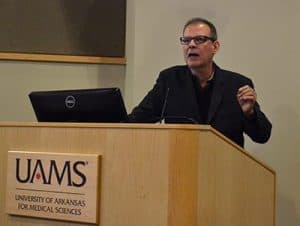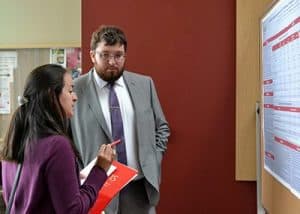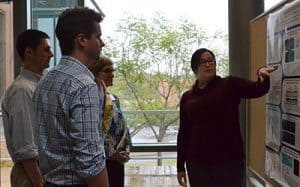McGehee Lectureship Speaker Says Science Must Lead Its Own Reform
| April 25, 2016 | The scientific enterprise is damaged but not broken.
That was the message delivered April 13 by Arturo Casadevall, M.D., Ph.D., during the fifth Robert E. McGehee, Jr., Ph.D., Distinguished Lectureship in Biomedical Research.

Arturo Casadevall, M.D., Ph.D., tells a UAMS crowd that the scientific enterprise is under attack from external and internal forces.
Casadevall is a Bloomberg Distinguished Professor and chair of the W. Harry Feinstone Department of Molecular Microbiology and Immunology at the Johns Hopkins Bloomberg School of Public Health in Baltimore, Maryland.
In his presentation, “Science at a Crossroads: Time for Reform,” Casadevall made the case that the scientific enterprise is under attack from external and internal forces.
External forces that Casadevall mentioned were inadequate funding, societal focus on short-term rewards, educational debits, a reduced focus on basic science, workforce imbalances and the fact that we live in an anti-intellectual era where science is under attack.
While these are troubling issues, he said, they are less damaging to science than internal forces, which include disproportionate rewards to winners, obsession with surrogate markers of importance such as impact, over-specialization of researchers, the scientific economic system and poor communication with the public.

Brett Bailey, a student in the College of Pharmacy, presents his research, “Perceived motivating factors and barriers for the completion of postgraduate training among American pharmacy students,” at Student Research Day.
Casadevall criticized the National Institutes of Health (NIH) peer review system, saying it is worse than a lottery because it is not random and biases creep into the decisions that are made.
He suggested a modified lottery system for NIH funding. All applications would go to peer review to divide them into two groups: meritorious and non-meritorious. The meritorious ones would then be put into a lottery for possible funding, while the non-meritorious ones would be sent back to their submitting researcher with a critique.
This modified lottery would have the immediate advantages of favoring young investigators, reducing gender bias and reducing racial bias, he said.
Casadevall also said the scientific community needed to do something about the growing number of retractions and the problems with reproducibility of scientific results.
“The problem with science today is the norms of science — responsibility, rigor and reproducibility — are out of sync with the scientific reward system. What do we reward? Impact,” he said.
His suggestions for reforming science included focusing on findings, not papers; enhanced rigor and checklists; finding new ways to give credit rather than supporting a winner-takes-all system; and enhanced focus on ethics.

Caylin Winchell, a student in the Graduate School’s Microbiology and Immunology program, explains her research, “Manipulation of macrophage autophagy by Coxiella burnetii,” during Student Research Day.
“Science is not broken,” he said, but it does need to be reformed.
As McGehee, dean of the UAMS Graduate School, kicked off the lecture, he said he is “humbled whenever he thinks about the family who donated the endowment to establish this lecture series in my name.” He said it was only fitting that the distinguished lectureship, established in 2011, be held as part of Student Research Day.
With 127 abstracts submitted, this year’s Student Research Day was the largest UAMS has ever held, McGehee said.
“With the fantastic turnout we had this year, I feel like I’m at a national conference with all of these posters set up and people interacting with them,” he said.
The posters were presented during morning and afternoon sessions. After the poster sessions, the 13 students with the highest score were given awards. They were:
Graduate Students
- 1st — Maroof Zafar, Biochemistry and Molecular Biology; Roy Morello, Ph.D., mentor
- 2nd (tie) — Jacob Latham, Microbiology and Immunology; Jon Blevins, Ph.D., mentor
- 2nd (tie) — Courtney Cook, Genetic Counseling; Mindy Simonson, Sc.M., CGC, mentor
- 3rd — Wezley Griffin, Biochemistry and Molecular Biology; Kevin Raney, Ph.D., mentor
Postdoctoral Fellows
- 1st — Eva Carolina Diaz Fuentes, Ph.D., Pediatrics, Arkansas Children’s Nutrition Center; Elisabet Borsheim, Ph.D., mentor
- 2nd — Manish Saraf, Ph.D., Pediatrics-Developmental Nutrition; V. Laxmi Yeruva, Ph.D., mentor
Professional Students (M.D., Pharm D., etc.)
- 1st — Wilson Alobuia, College of Medicine; Jeffrey Marotte, M.D., mentor
- 2nd (tie) — Sean Parham, College of Medicine; Larry Suva, Ph.D., mentor
- 2nd (tie) — Oktawia Clem, College of Pharmacy; Alan Tackett, Ph.D., mentor
- 3rd — Elisabeth Mathews and Taylor James, College of Pharmacy; Kathryn Neill, Pharm. D., mentor
Residents/Fellows
- 1st — Jordan Heath, M.D., Internal Medicine; Joshua Kennedy, M.D., mentor
- 2nd — Natalia Colorado, M.D., Pediatric Hematology/Oncology; Jason Farrar, M.D., mentor
